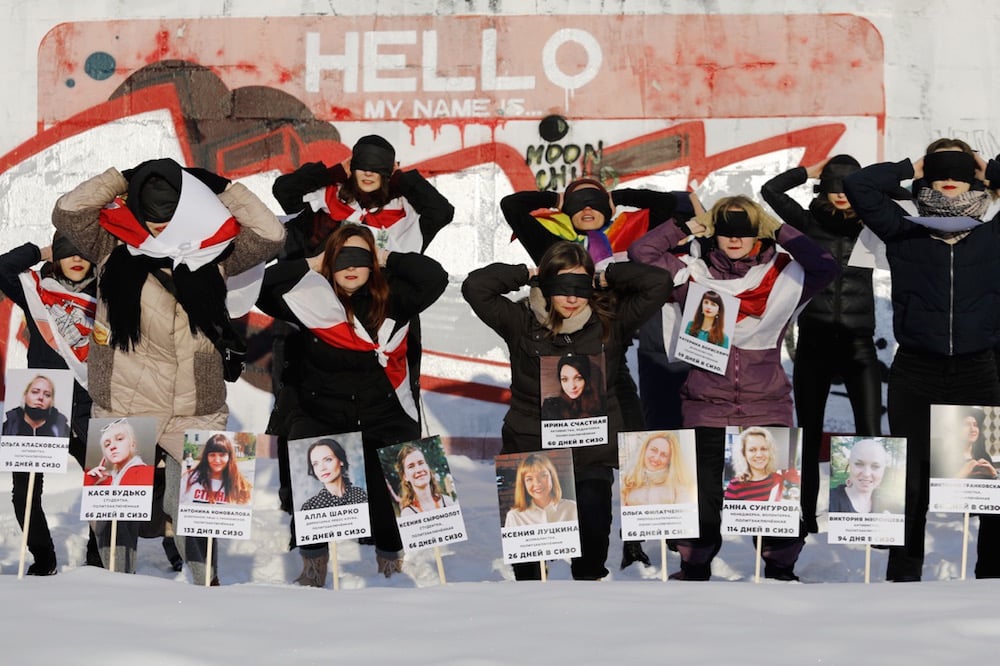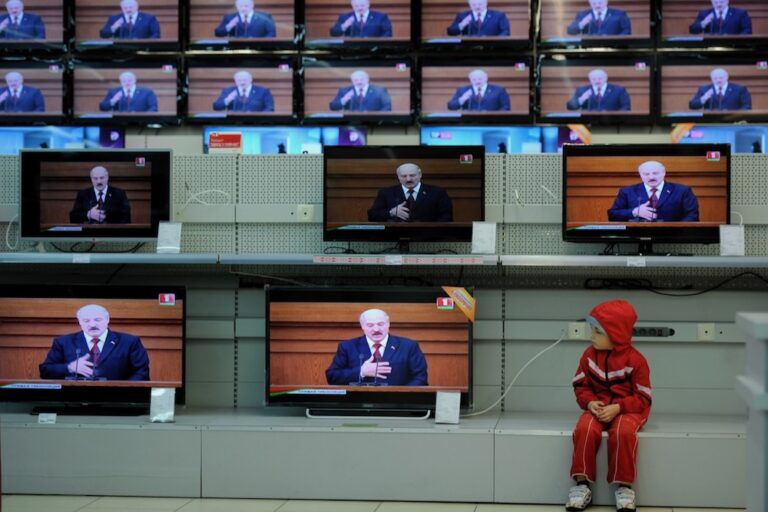IFEX joins Reporters Without Borders (RSF) and other members of a human rights NGO coalition in calling on the European Commission, the European Council, the Council of the European Union and the European Parliament to adopt new sanctions and recommendations for Belarus.
This statement was originally published on rsf.org on 9 February 2021.
Reporters Without Borders (RSF) and other members of a human rights NGO coalition are calling on the European Commission, the European Council, the Council of the European Union and the European Parliament to adopt new sanctions and recommendations for Belarus.
Ursula Von der Leyen, President of the European Commission
Charles Michel, President of the European Council
David Sassoli, President of the European Parliament
Antonio Costa, Portuguese Prime Minister, in charge of the Council of the EU’s rotating presidency
Subject: The European Union response to the unprecedented, six-month-old crackdown on the media in Belarus
Paris, 9 February 2021
Dear Madam President, Mr. Presidents,
We, NGOs defending human rights and the freedom to inform, feel it of vital importance to share with you our deep concern about the unprecedented crackdown on the media in Belarus, which is continuing despite the international community’s condemnations.
Since 9 August, we have observed around 400 cases of journalists being arrested just for doing their job covering massive, peaceful protests against President Alexander Lukashenko’s fraudulent reelection. At least 62 cases of physical violence against journalists have been registered since 9 August and 11 journalists are currently jailed. Arrests of journalists are leading to convictions with increasing frequency, the length of provisional detention keeps on growing, and journalists are often mistreated when detained, even if only briefly.
The European Union has reacted to the fraudulent nature of this reelection and to the violent crackdown by progressively imposing sanctions on Belarus, in particular, sanctions targeting persons identified as responsible for acts of repression and intimidation against journalists.
By adopting these restrictive measures, we believe the European Union has taken a step in the right direction. However, these sanctions will not suffice to end the crackdown.
Far from declining, the attempts to silence all critical or objective reporting are continuing in Belarus, and the authorities have now opted to press criminal charges against journalists working for the country’s few remaining independent media outlets. Several of them, including six women, were recently charged with “organizing and preparing events seriously undermining public order” and are facing the possibility of up to seven years in prison.
After six months of this unprecedented crackdown, the international community and European Union cannot fail to see that the measures adopted have not prevented the latest disturbing authoritarian escalation by the Belarusian authorities. During an Arria formula meeting of the UN Security Council on 22 January, a score of European Union member states condemned the intensified crackdown on dissent and deplored the lack of cooperation by the Belarusian authorities and their failure to respect their international obligations regarding freedom of expression and opinion, including journalists’ safety.
We therefore now urge your European Union institutions and member states to adopt the following recommendations in a spirit similar to those of the October 2020 Benedek report (1) :
– Freeze all disbursement of financial assistance to the Government of Belarus under the European Neighbourhood Instrument (2) for as long as the common values and universal fundamental values of the rule of law and human rights are not respected;
– Continue imposing economic sanctions and other restrictive measures on individuals and entities implicated in or supporting violations of international electoral norms and international human rights law, especially violations of freedom of expression and freedom of the media;
– Suspend all or part of EU funding to the government of Belarus on the grounds of serious or persistent deterioration of democracy, human rights or the rule of law in Belarus. To this end, accelerate European Parliament and Council adoption of the regulation offering the Commission this possibility under its neighbourhood policy;
– Offer and increase assistance to threatened journalists and media workers, such as safe passage through their territory, refuge and medical assistance if necessary.
– Support independent media outlets working either in or for Belarus, through a dedicated mechanism.
On 17 December, the EU said (3) it was “ready to support a peaceful democratic transition with a variety of instruments, including a comprehensive plan of economic support for a democratic Belarus” and to “adopt further sanctions, including on other economic actors, if the situation in Belarus does not improve.”
In the manifest absence of improvement in Belarus, we hope that the European Union will keep this promise.
We look forward to a clear response from you to these concerns.
- OSCE Rapporteur’s Report under the Moscow Mechanism on Alleged Human Rights Violations related to the Presidential Elections of 9 August 2020 in Belarus, available here.
- Except assistance allocated to supporting civil society organizations and non-state actors for actions promoting human rights and fundamental freedoms
- https://www.consilium.europa.e… of-sanctions-over-ongoing-repression/
Sincerely,
- Christophe Deloire (RSF)
- Clothilde Redfern (Rory Peck Trust)
- Jessica Ní Mhainín (Index on Censorship)
- Laurens Hueting (European Centre for Press and Media Freedom)
- Leon Willems (Free Press Unlimited)
- Sarah Clarke (ARTICLE 19)
- Annie Game (IFEX)
- Scott Griffen (IPI)
- Polina Sadovskaya (PEN America)
- Sara Whyatt (PEN International)
- Andrew Heslop (WAN-IFRA)



